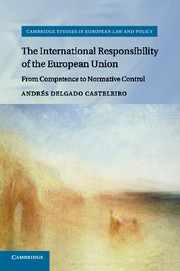Book contents
- Frontmatter
- Contents
- Series Editors' Preface
- Acknowledgements
- Introduction
- 1 The EU's Normative Control and International Responsibility
- 2 Codifying of the Responsibility of International Organizations (I): The Impact of ARIO's Rules of Attribution on the EU
- 3 Codifying of the Responsibility of International Organizations (II): The Impact of ARIO's Rules of Responsibility on the EU
- 4 EU Declarations of Competence to Multilateral Agreements: A Useful Internal Reference Base?
- 5 The Apportionment of the EU's International Responsibility in International Environmental Law: The International Application of EU Declarations of Competence
- 6 The EU's Normative Control and International Responsibility: The WTO Dispute Settlement System
- 7 Normative Control in the EU and the Responsibility of Member States: An Analysis of the Responsibility of the EU in International Investment Law
- Conclusions
- Bibliography
- Index
5 - The Apportionment of the EU's International Responsibility in International Environmental Law: The International Application of EU Declarations of Competence
Published online by Cambridge University Press: 05 September 2016
- Frontmatter
- Contents
- Series Editors' Preface
- Acknowledgements
- Introduction
- 1 The EU's Normative Control and International Responsibility
- 2 Codifying of the Responsibility of International Organizations (I): The Impact of ARIO's Rules of Attribution on the EU
- 3 Codifying of the Responsibility of International Organizations (II): The Impact of ARIO's Rules of Responsibility on the EU
- 4 EU Declarations of Competence to Multilateral Agreements: A Useful Internal Reference Base?
- 5 The Apportionment of the EU's International Responsibility in International Environmental Law: The International Application of EU Declarations of Competence
- 6 The EU's Normative Control and International Responsibility: The WTO Dispute Settlement System
- 7 Normative Control in the EU and the Responsibility of Member States: An Analysis of the Responsibility of the EU in International Investment Law
- Conclusions
- Bibliography
- Index
Summary
Preliminary Remarks
The previous chapter signalled the main problems that declarations of competence pose when examined closely and that Multilateral Environmental International Agreements (MEIAs) are the most common scenario in which the EU makes a declaration of competence. Moreover, the previous chapter showed also how the Court of Justice of the EU (CJEU) had approached their interpretation and how this application highlighted some of the problems that these declarations entail. By contrast, this chapter examines their international application by providing an overview of the disputes where the EU has been involved and concerning the application of an MEIA with a declaration of competence.
Thus, the present chapter focuses on whether and how the declarations of competence are being applied by international environmental courts. By analysing the existing practice on the issue, it is possible to test the relevance and usefulness of the declarations as way of apportioning the international responsibility of the EU and its Member States. Moreover, it is also possible to better understand how they help in dealing with the EU's international responsibility. This chapter is divided in two parts. In the first part, the chapter focuses on the main aspects of the EU's participation in the UNCLOS. It examines on one side how UNCLOS envisages the EU's participation in the agreement by focusing on Annex IX, and its application. Three disputes are the centre of the section: the international part of the MOX Plant case; Chile v European Union (the Swordfish case); and the Request for an Advisory Opinion Submitted by the Sub-Regional Fisheries Commission (SRFC Advisory Opinion).
The second part of the chapter moves its analysis to the Aarhus Convention, which does provide a mechanism by which individuals (mainly environmental NGOs) can bring complaints against the Convention contracting parties. Therefore, the reports of the Aarhus Convention's Compliance Committee (ACCC) should be a fertile ground to observe how an international body applies an EU declaration of competence. Yet, this section shows that declarations of competence are barely mentioned (if at all) within the Aarhus Convention. Moreover, this section shows how the EU's normative control plays a role in how breaches are attributed within this international agreement. The last section draws some conclusions on the actual relevance of the declarations of competence as a useful tool to determine when the EU is internationally responsible.
- Type
- Chapter
- Information
- The International Responsibility of the European UnionFrom Competence to Normative Control, pp. 130 - 160Publisher: Cambridge University PressPrint publication year: 2016



